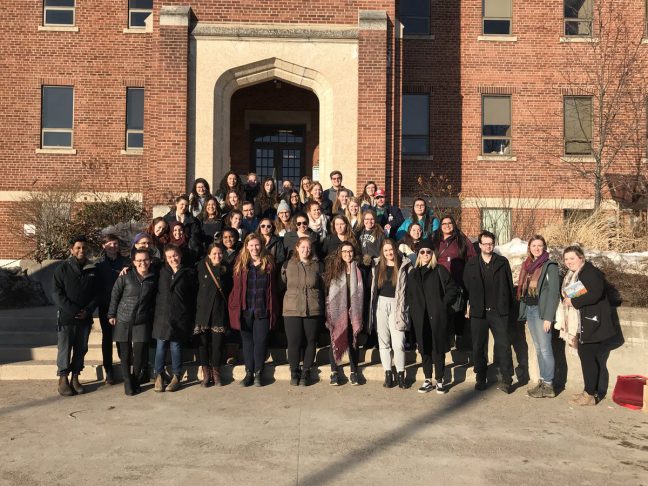Photo: Kings students standing in front of Shingwauk Hall, Algoma University.
Earlier this month I had the privilege of hosting over 40 students from King’s University College (Western University) during their visit to Algoma University. The students spent a really long time on a bus traveled to Sault Ste. Marie, Ontario to spend a couple of days immersed in learning about residential schools and Indigenous communities.
This visit was somewhat unique in that it was completely organized by students. The trip was framed as a unique educational opportunity and as enrichment but not tied to one specific course. The students were from a mixture of undergraduate disciplines and were at varying points in their respective programs. The organizing group approached me in October of 2017 with the idea for their trip and after months of correspondence and planning it was fantastic to see this experience come together.
The students had two full days of intensive programming on campus. The agenda included a historic our of the Shingwauk/AlgomaU site, discussion with a residential school survivor, an Indigenous youth panel, workshops facilitated by local Indigenous community partners, attending the Gathering at the Rapids Pow Wow, and lots of time for discussion and reflection. It was a heavy couple of days with a lot of deep learning and with an emphasis on experiencing things first hand. For many students it was their first time being on the site of a former residential school and it was the first time they had interacted with a residential school survivor in person.
Opportunities For Success
One of the byproducts of intensive learning is the sense of team building and community feeling that grows out of engagement in a transformative educational opportunity. For me, the creation of a safe space and the generating of a community feeling were an essential part of developing the King’s programming. Our opening activities, breakout sessions, and discussions were designed with inclusive and safe space practices in mind. We also attempted to take a decolonized approach to debriefs by using sharing circles instead of Western classroom style engagement tools.
One of the benefits of intensive learning is the ability to incorporate experiential elements. This could looks like visiting local heritage sites, speaking with community members, or engaging in local events. I think the best intensive learning models look beyond the walls of the classroom and engage students in activities that they would not be able to experience as part of their regular coursework.
Space For Growth
One of the obvious challenges of intensive learning opportunities is the limited amount of time. Facilitators are often trying to make the most out of a short time period by combining a range of learning opportunities and reflection techniques. Inevitably, something isn’t going to make it into the final agenda. This can be mitigated in part by providing resources for students to engage with prior to and following the intensive period. This might take the form of required reading or viewing before the event, a list of take home resources, or a discussion forum organized to occur after the intensive.
In the case of the King’s visit one of the challenges was building in enough processing and reflection time. Dealing with historical trauma and first hands accounts of violence, systemic racism, and abuse can be challenging. We wanted to make sure that students left each day with tools to process the new information they were presented with and to ensure that they left knowing what support resources were available to them. Considering we only had two days together we spent a lot of that time in discussion and we engaged in a number of debrief and summary discussions.
As a facilitator I find intensive learning really rewarding, it is wonderful to be part of a group that is on an educational journey and to see them progressing in their understanding of a complex historical topic. Acting as a facilitator to this type of event is also really draining. Being on point for over eight hours each day is exhausting. I would recommend building in co-facilitators or guest workshop leaders to any intensive learning program. A collaborative approach to delivery means that the burden of instruction isn’t falling on one or two people – who will definitely be exhausted by the end of the experience.
Balance
Come up with experiential learning opportunities and developing schedules for intensive learning events can be challenging. Come up with engaging programming that covers a range of topics and fitting it in a two or three days is tricky. For folks engaged in this type of work I would suggest building in evaluation time, that way staff and participants can provide feedback on what worked and didn’t work. One of the things I would consider going forward is making sure there is more ‘active’ time build into each day — even just doing activities which require participants to move around the room can help breakup long periods of sitting, which can be hard on attention spans and physical bodies.
Have you participated in any intensive learning programs? Do you like this style of education opportunities?

